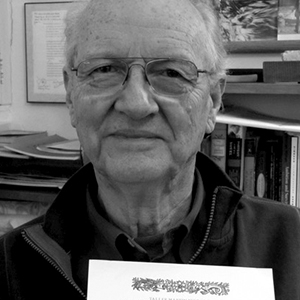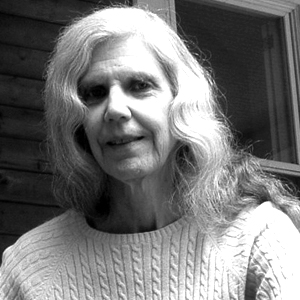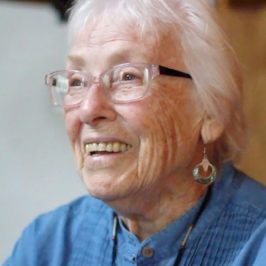



Appreciating the form and flow of words, with poems by Wells Burgess, John Ridland, Nancy Carlson and Nan Fry.
7 minutes
TRANSCRIPT
On this episode, four poems written in form.
Wells Burgess said that in the sestet of his poem — that’s the last six lines — his sonnet shifts from riffing on the language of TV mail order promos to a poignant longing for a rerun of one’s life. He said, “I will never resign myself to the loss of this childhood promise, and my writing poetry constitutes a relentless argument against that loss.” Here’s his sonnet “Not Available in Stores.”
Just $19.95! Does your husband snore?
Try this and if you purchase it before
the hour, the shipping’s free. Cleaning a chore?
This mop will soap and rinse and wax your floor
like magic in a single stroke. Your core
too flabby? Want to up your sit-up score?
This machine will turn those squishy s’mores
to washboard iron. But wait, there’s more!
We have a key that will unlock the door
to ancient yearnings, la promesse de bonheur,
a second run of the life you’ve lived, an encore
purged of loss, regret, the old rancor
winnowed away. You must act now! The hour
is late. Not available in stores.
“Not Available in Stores,” Wells Burgess from Passager Issue 69.
This next poem is also a sonnet but not the 14-line sonnet that we learned about in school. This is a “curtal” or “curtailed” sonnet. Victorian poet Gerard Manley Hopkins came up with it. It’s 11 lines rhyming abcabc dcbdc with the last line a tail, or half a line. John Ridland wrote this one, “To the Youthfully Aging,” which he says is a curtal sonnet after G. M. Hopkins’ “Pied Beauty”
“I was that slender eye-bedazzler once,”
You brood, missing the dazzle you show now,
A beauty undiminished by false light —
Entirely yours, not obvious to a dunce,
Though any old-school man who tries to bow
And kiss your hand, should know that isn’t quite
The way, this century, he should pursue it.
Indeed, you might well glower or knit your brow.
Accepting what you have to is a rite
Of passage, which, if you find your way through it
Stays bright.
John Ridland’s curtal sonnet “To the Youthfully Aging” from Passager Issue 67.
Nancy Naomi Carlson said, “Most of us are still reeling from the losses we’ve experienced during the ongoing pandemic, which often brings to the fore all our previous losses, including the deeply personal ones. And yet we go on.” The poem she wrote in response to that idea, “Phantom Pain,” is a villanelle. A villanelle has five three line stanzas. The first and third lines of the opening stanza alternate as the last line of the remaining stanzas. Then at the end, there’s a four-line stanza that contains both lines. Got it? There’s going to be a quiz. The most famous villanelle, probably, is Dylan Thomas’s “Do Not Go Gentle Into That Good Night.”
“Phantom Pain” begins with the epigraph “after a line by Samuel Beckett.”
Every loss recalls another loss
eroding more of you, a brine-lashed cave.
The end is in the beginning yet we go on.
Grief springs out of sofas, credenzas, and drawers.
Masking and distance can’t stop the ache.
Every loss recalls another loss,
like delving inside a wooden nesting doll —
the hard-to-open smallest reveals hollowed space.
The end is in the beginning. We go on
despite the empty chairs and beds — the way they’d want
us to, to hell with booby-trapped DNA.
Every loss recalls another loss.
Cut out the troubled cells — offer a leg or an arm
or even two — you’ll still feel the phantom pain.
The end is in the beginning. Going on,
we learn to patiently sift through day-to-day dross
for the words to divine the endgame.
Every loss recalls another loss.
The end is in the beginning. Go on.
Nancy Naomi Carlson’s villanelle “Phantom Pain” from the brand new — not even in the mail yet — Passager Issue 74.
We’ll end with a riddle poem by Nan Fry. She said, “I enjoy riddle poems because they refresh our perception of the world by presenting something ordinary and familiar in a way that is mysterious. And what is more mundane and mysterious than the platform that launches us into our dreams?”
With that hint, see if you can figure out what the answer is.
With four legs and one foot,
I cannot move, yet I carry you off.
The clothes I wear keep you warm.
Though I’m not a boat,
I float you on a tide of change.
When you ride upon me,
the familiar grows strange.
Nan Fry’s poem “riddle” from Passager Issue 50.
It’s easier sometimes to understand these poetic forms when you see them on the page. Or screen. You can see these poems (and their forms) by going to the Burning Bright page on Passager’s web site.
To subscribe to or learn more about Passager and its commitment to writers over 50, go to passagerbooks.com. You can download Burning Bright from Spotify, Apple and Google Podcasts and various other podcast apps.
For Kendra, Mary, Christine, Rosanne and the rest of the Passager staff, I’m Jon Shorr.
The answer to the riddle poem, by the way, is a bed.
Due to the limitations of online publishing, poems may not appear in their original formatting.






